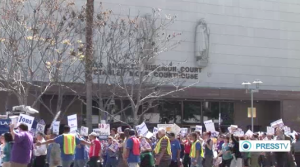The NBC affiliated TV station in San Francisco has broadcast a strong story about court delays due to ongoing budget cuts, including a court critic who notes that the judicial administrators are partly to blame for poor spending decsions. The “Bay Area Investigative Unit” found delays in every one of California’s 58 Superior Court systems and documented backlogs that included 30,000 documents stacked on one court’s floor awaiting proper filing.
Among the hard-hit are family courts, and the Investigative Unit reported the story of a Contra Costa County family court custody dispute for more than three years, leaving five and seven year old kids in legal limbo.
“I see my children,” the mother involved in the custody battle told the station. “They cry for me.”
Watch the report here. (Editor’s note: the print version on the website is a bit different from the video, which includes more details.)


